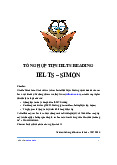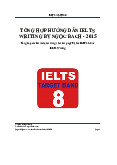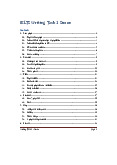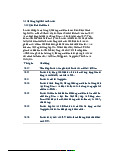





Preview text:
Test 70
You will hear a number of different recordings and you have to answer questions on what you
hear. There'll be time for you to read the instructions and questions and you have a chance to
check your work. All the recordings will be played only once. The test is in four sections. At the
end of the test, you will be given 10 minutes to transfer your answers to your answer sheet. Now turn to section 1. Section 1.
You will hear a guide introducing tourists to the Red River Festival.
First you have some time to look at questions 1 to 4.
Now listen carefully and answer questions 1 to 4.
You will see that there has been an example written for you. On this occasion only, for the
conversation relating to the example will be played first.
Now as I'm sure you know, the Red River Festival that is the Red River International Music and
Arts Festival to give it its full name is on while you are here and I'm sure I speak for all the
inhabitants of Red River and inviting you most cordially to attend.
The festival is about Arts and Music. So, answer ‘C’ has been circled.
Now we will begin. You should answer the questions as you listen, as you will not hear the
recording a second time. Listen to the talk carefully and answer questions 1-4.
The festival takes place over a long weekend that is it starts on the Friday afternoon and runs
until Sunday evening. Normally, the festival would take place on the fourth of July. The same
day is American Independence Day, but this year we've rescheduled it for the 4th of August.
Now you can buy tickets for this festival either by the day or for the whole festival. The second
option is cheaper, although of course, not everyone can attend for the whole time. A day's ticket
is $10 and it's $25 for the whole festival. That's very good value. If you want tickets, you're
advised to get them early, because there are always more visitors than tickets. Space is limited.
So, buy early. You can get them direct from the festival organizers headquarters, the festival
office and I'll give you that address later or you can get them from any of our three post offices
or one of the many bookshops in the town.
Last year, we issued them from tourists advice centers and the town hall. But this year, we
decided to limit the number of outlets to cut down on administrative costs.
Before the talk continues you have some time to read questions 5 to 10.
Now listen carefully and answer questions 5 to 10.
The weather is looking good. The forecast is expected to be one of the hottest and sunniest
weekends of the year. So it's perfect for the festival. Although I would remind you to cover up
and be aware of the dangers of too much sunshine. If it gets too hot for you, you could always
stay inside for some of the indoor events. And of course, you'll be able to get food from
sandwiches and snacks to barbecues as well as ethnic fast food from several standpoints.
There will be a bar this year, but after last year, we will only be selling soft drinks beer and wine.
We have decided not to bother with a Spirits license. There won't be any whiskey on sale. So
what's on? Well, I can only give you a flavor of the many attractions we have coming this year.
But if I can name one of my personal favorites, you must PD's dozen, a traditional New Orleans
jazz band. They were here last year and we're so popular that the we've invited them back. If
you like classical music, we've got a string quartet from Poland appropriately called strings
playing classical favorites. We've also got rock bands, a blues band from the UK, a group of
traditional Bavarian beer hall singers and another of my favorites the Fiddler's who come from
Ireland - their special brand of Folk Music is popular all over the world. Moving on, then to
Other attractions in the Red River area for children. There's lots to do and see from museums to themeparks…
That is the end of Section 1 you will have half a minute to check your answers. Section 2
You will hear a man and a female bank employee talking about getting a loan.
First, you have some time to look at questions 11 to 16.
Listen carefully to the discussion and answer questions 11 to 16.
Employee: County District Bank customer services. Can I help you?
Man: Hello. I need to speak to someone about getting a loan and overdraft.
Employee: Yes. Perhaps I can help you. Do you bank with us sir?
Man: Yes. My name is Miko Drew.
Employee: Sorry sir. Your surname is?
Man: O Drew. Nick O Drew, but my full name is Michael.
Employee: Can I have your account number, please? Man: Yes, it's 3926 1916.
Employee: That's fine. Now I just need to confirm some details for security reasons. What's your address?
Man: It's 24 Qilvetan Drive, that's in Chalvey. That's Chalvey. The postcode is SA39ER.
Employee: And your telephone number? Man: 045888320.
Employee: Can you tell me your date of birth Mr. O Drew?
Man: Yes, it's 23rd of February 1967.
Employee: Thank you. Now, there are some gaps in your file here. I don't seem to have an address for you at work.
Man: No when I joined your bank. I didn't have a job, but I do now. I work for Calvin engineering
that's in Carberry. If the address is 13 Works Yard, Carberry,
Employee: Could you repeat that?
Man: Works Yard. WO RK S Y ARD it's two words,
Employee: Right. Thank you. Do you have a telephone number where we can contact you please? Man: Yes. It's 0912 79509 Employee: 7509 Man: no, it’s 79509.
Employee: Alright, okay, how long have you been there, Mr O Drew?
Man: I started in 1997, no, 1998.
Employee: Okay. That’s fine. And how much is your salary?
Man: Well, I’m not sure exactly. But it’s about 18,000 pounds.
You know how some time to look at questions 17 to 20?
Listen to the rest of the discussion and answer questions 17 to 20.
Employee: Now. You would like an overdraft? Do you have any other major debts? Man: What would you mean?
Employee: Well are you paying mortgage on your house? Man: Yes.
Employee: How much is that every month? Man: It's about 450 pounds.
Employee: I see, have any credit cards or store cards?
Man: Yes. I pay 45 pounds a month in credit card charges. Oh, and about 19 pounds a month
for my store card. That's with GH only the clothes shop.
Employee: Do you have any personal loans or hire-purchase agreements? Man: None whatsoever.
Employee: Right. Well, the loan shouldn't be a problem. I can set it up for you in the morning.
I've set you a limit at 250 pounds, although you can raise this to 300 pounds.
If you're still having problems, just give us a ring if you need to.
Man: Oh, that's great. Thank you. Goodbye. Employee: Goodbye, sir.
That is the end of section 2 you will have half a minute to check your answers. Turn to section 3 Section 3
You will hear a conversation between two students David and Maria about the candidates
for an election for student office.
First, you have some time to look at questions 21 to 23.
Listen carefully to the conversation but answer questions 21 to 23.
David: Hi Maria. Have you voted yet?
Maria: Hello David. What did you say?
David: Have you voted yet? You know in the Student Union elections.
Maria: Well, no, I mean they've only just released the names of the final candidates.
David: The first-round elections were only held last week, but I voted already.
Maria: Yes, but that's the first round. You know how this works, don't you?
David: Well, not exactly. I mean I thought you just voted.
Maria: It's pretty simple, but it's made more complicated because this university has four
colleges not just one. Each College can have many candidates for each post. These are
reduced to a logical number. Then the real voting takes place.
David: So, what did I vote for last week?
Maria: That was the first round. Like I said you voted for the candidates for Peterborough
College. That's all. There are also candidates from the other three colleges. David: Oh, I see.
Maria: Well, there are seven positions to apply for in the union. Although two of those are dealt
with later in the year. That's the president and the vice president. Anyway, each college sends
one candidate on to the second round. So that's four and all for each post. In other words.
David: In other words, it's 20 candidates. It’s quite a lot.
Maria: It isn’t when you think that there are 14,000 students at this college.
David: No, I suppose not … Can they all vote?
Maria: Yes, part-time and full-time students everyone but most don't. Only about a quarter of
those eligible to actually bothered.
You now have some time to look at questions 24 to 30.
Listen to the rest of the conversation and answer questions 24 to 30.
David: So, who are the candidates from our college?
Maria: There was a leaflet about it this week. Some of the students stood as candidates for
several posts before the final ones were selected. I think Jenny de Groot is standing for
women's officer. She wanted to be finance officer. But Laura got that post.
David: She seems more suited to working for the female students.
Maria: Yes, I like her. She's the best person for the job. I'm not sure I'd support Michael
McCarthy for his post. He's putting up for entertainments officer.
David: Doesn’t he arrange the Saturday night band for the college and the sports events?
Surely, he'd be ideal. He has so much experience.
Maria: Maybe. I don't think he chooses the right kind of groups for the cottage. He's too way out. He's not my choice.
David: Who's the candidate to be overseas officer?
Maria: A Chinese student who's been here for just over a year. She's the president of the
chinese club and she organizes some interesting cultural evenings for them. She seems to be quite capable.
David: Do you really think so? She's in my seminar group for Linguistics. Her English is quite
dull and she's so shy she never mixes with us.
Maria: Oh, there are 30 different nationalities here. So she'd need to be more sociable perhaps
Vikram Patel would have been a better choice.
David: Yes, I think so. Who did you say was finance officer? Law? Charles Law? He does
accountancy. So, he should be able to cope with the boast. He be responsible for a lot of money.
Maria: I've always thought he was unreliable. And didn’t he fail some of his exams in the first
year? Doesn't sound too competent to me.
David: Okay. Yes. You're probably right. Who's the other person on the list? Maria: It's Brian McKay.
David: Oh Mckay, he's quite a character. What position is he standing for?
Maria: He wants to be the liaison officer - the person who lets the teaching staff know about any
problems the students might have. He's such a sociable person. He'd be a great communicator.
David: Yes. He's articulate and well organized, but he wouldn't be my first choice. Anyway,
they're only the candidates from Peterborough College. We’ll have to wait for the results of the
election next week to see what actually gets each post.
Maria: Yes. We can discuss this again.
That is the end of Section 3, you know have half a minute to check your answers. No, turn to section 4.
Section fill you will hear a lecture and giving a talk on languages first. You have some
time to look at questions 31 to 40.
Now listen carefully to the talk and answer questions 31 to 40.
Thank you for coming. We all here? Right. Well, let's begin this lecture. As you know, this is the
third in our course – ‘Introduction to Linguistics’. Today, we'll be looking at a variety of different
languages not to any one specific one and we'll be looking especially at languages which can
help us understand how both language and languages evolve. Another issue that we will be
exploring is the way in which languages have changed over time. These are fairly complex
areas and they have proved to be rather difficult to grasp and there are many different theories
some of which we will look at today.
But first I want to talk briefly about a few different ways of looking at a language, you know, the
language we all speak - English is what is called a natural language like French, German,
Greek. What do we mean by that? Well, it's a difficult term to define because most languages
have evolved naturally. Except for a very few such as this parental which was invented in the
19th century. So, I supposed what we mean by natural isn't language which we consider stable,
fixed, not constantly changing.
We know languages are in fact constantly changing. So, it's something of a misnomer but let's
put it another way, natural languages are considered by us to be permanent. They didn't appear
suddenly. They grew up, out of other things. Now, I want to contrast these languages with two
other kinds of language. Pidgin languages and Creole languages
Pidgin language is a language which is forced into being by circumstances. Usually some sort of
situation where two groups meet and don't speak each other's language and they invent an
intermediary language usually for the purpose of trade or sometimes war - an example Tok
Pisin is a Pidgin spoken in Papua, New Guinea. A crayon language on the other hand develops
from a Pidgin into a full language that this happens when the Pidgin starts having native
speakers that is people whose first language is the Pidgin. This happened in the case of the
French Creole spoken in New Orleans, for example, Pidgins are found all over the world,
especially in areas, which are once important trade routes
The Caribbean, China, Indian, the Pacific basically Pidgins can be identified with one or two
important characteristics. They are made up of parts of the two languages spoken by the group
that have met - the trading groups or whatever and they are usually based on a simplified form
of one of those languages - that is their grammar is a less complicated version of the grammar
in one language. They use vocabulary from both languages, but there are fewer words. So,
each word often has a lot more than one meaning.
For example, in Tok Pisin, Gras Bilong meets hair or beard. The pronunciation is also made
simpler as Pidgins lose the complex valves of the parent languages. Creoles on the other hand
formed when Pidgins I learned as a first language or just as complex as so-called natural
languages. They are expanded Pidgins that there is often a considerable element of
politicization. As the emphasis moves from communication, which the Pidgins speakers is most
important to community which is the mark of a creole. That is - a Creole is a community who
speak a different marginalized language. They often have to struggle to get their language
recognized as to where pigeons come from, there are basically two theories. First, claims that
Pidgins are descended from a medieval trading language what you might call the first Pidgins
called Serbian. This is believed to have been based on Portuguese. It was spread as the
Portuguese traders went from place to place.
That is the end of section 4 you will have half a minute to check your answers.




